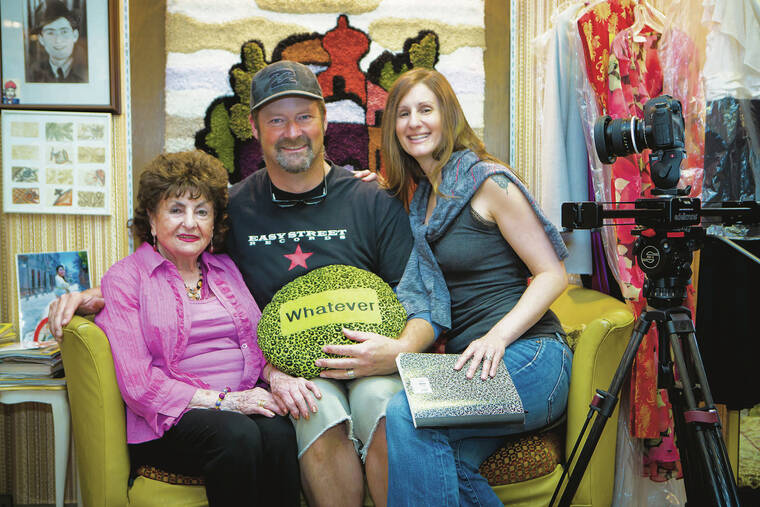At 91, Sonia Warshawski was about to be evicted from the tailor shop she’d run for over 30 years in a defunct shopping mall, but she didn’t intend to go quietly into the night.
More than a beloved place of business to her longtime customers, the shop has been a way for her to keep busy. For this atypical Jewish grandmother, it has been a fortress that has enabled her to stave off harrowing memories of the World War II Holocaust. Like millions of persecuted Jews, she’d suffered severe beatings, was shot in the chest while imprisoned in concentration camps and watched her mother forced into a gas chamber.
“If there is a hell, I was in that hell,” Warshawski recalls in the documentary “Big Sonia,” which premieres on PBS Hawai‘i at 8 p.m. April 30. The hourlong documentary is an abbreviated version of a movie, released five years ago by Maui-based filmmakers Leah Warshawski, Sonia’s granddaughter, and Todd Soliday.
Leah Warshawski, a University of Hawaii alumna, and Soliday, who is also her husband, first intended to make a short, funny family film about her quirky grandmother in Kansas City.
“Sonia is a ‘diva’ and she’s known for wearing leopard print and high-heel shoes — she is the most popular woman I know,” Leah Warshawski said. Her stylish grandmother insists on driving herself to work though she can hardly see over the steering wheel at 4 feet, 8 inches.
The directors meant just to focus on her endearing personality and determination, which enabled her to keep the shop, founded by her late husband, open against all odds. They had not intended to mention the Holocaust.
“But it was the elephant in the room,” Leah Warshawski said. Once people learned her grandmother was a Holocaust survivor and why the shop was so important, “that’s all they wanted to talk about,” she said.
They realized there was a much bigger story to tell, she said. The eviction stirred up a lot of trauma in Sonia.
“So retiring for her was not an option, because if she had retired, I don’t know that she would be able to function,” Leah Warshawski said.
Since the directors wanted to reach a younger audience, they did not use World War II archival footage that would be too graphic and hard to watch — “we didn’t want to make people look away” — but used animation instead for the more brutal scenes, Leah Warshawski said.
Despite the pain revived by her memories, even before the eviction notice, Sonia Warshawski started speaking publicly about her experiences after hearing racist skinheads deny the Holocaust ever occurred. The documentary shows how her testimony has inspired student groups and rehabilitation programs in prisons with her love and perseverance.
“If I can make a change in their heart and take out the hate,” she noted in the film, it will be an accomplishment.
There is a happy ending to Sonia’s story: Now at the age of 96, she still drives and works as often as she can in her new, relocated tailor shop, Leah Warshawski said.
The original 90-minute theatrical release in 2017 includes a lot more funny moments and “Soniaisms,” her grandmother’s quips on life lessons, than the 60-minute PBS version, she said. The original release, nominated for an Academy Award, was never shown in Hawaii but is available on Amazon.
An educational package that can be used in schools may be acquired on bigsonia.com Opens in a new tab.




